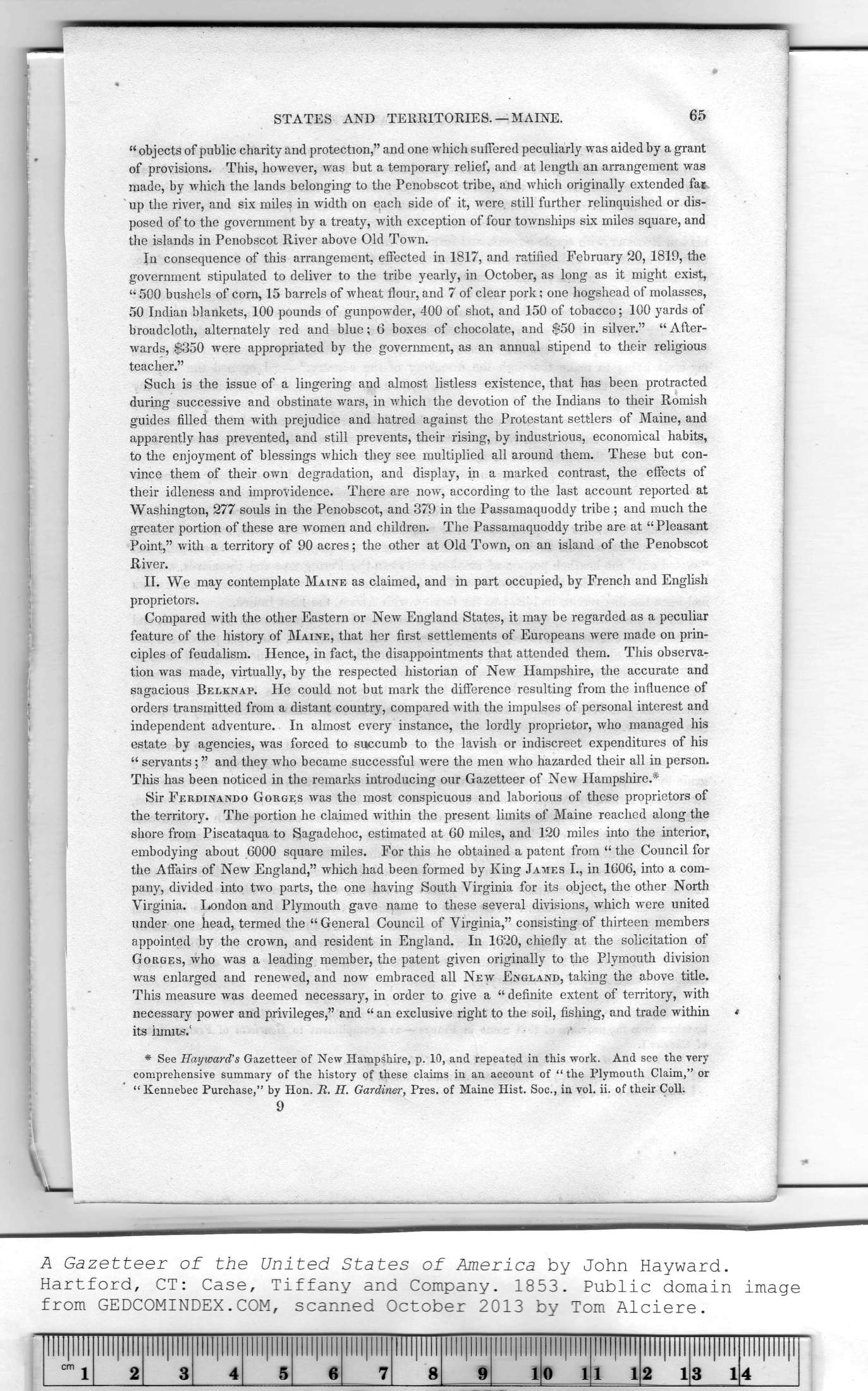|
|
Note: Ctrl and + increases the font size of the text below, Ctrl and - decreases it, and Ctrl and 0 resets it to default size.
STATES AND TERRITORIES.— MAINE. 65
“ objects of public charity and protection," and one which suffered peculiarly was aided by a grant
of provisions. This, however, was but a temporary relief, and at length an arrangement was
made, by which the lands belonging to the Penobscot tribe, and -which originally extended far
up the river, and six miles in width on each side of it, were still further relinquished or dis-
posed of to the government by a treaty, with exception of four townships six miles square, and
the islands in Penobscot River above Old Town.
In consequence of this arrangement, effected in 1817, and ratified February 20, 1819, the
government stipulated to deliver to the tribe yearly, in October, as long as it might exist,
“ 500 bushels of corn, 15 barrels of wheat flour, and 7 of clear pork; one hogshead of molasses,
50 Indian blankets, 100 pounds of gunpow'der, 400 of shot, and 150 of tobacco; 100 yards of
broadcloth, alternately red and blue; 6 boxes of chocolate, and $50 in silver." “ After-
wards, $350 were appropriated by the government, as an annual stipend to their religious
teacher."
Such is the issue of a lingering and almost listless existence, that has been protracted
during successive and obstinate wars, in which the devotion of the Indians to their Romish
guides filled them with prejudice and hatred against the Protestant settlers of Maine, and
apparently has prevented, and still prevents, their rising, by industrious, economical habits,
to the enjoyment of blessings which they see multiplied all around them. These but con-
vince them of their own degradation, and display, in a marked contrast, the effects of
their idleness and improvidence. There are nowr, according to the last account reported at
Washington, 277 souls in the Penobscot, and 379 in the Passamaquoddy tribe ; and much the
greater portion of these are women and children. The Passamaquoddy tribe are at “Pleasant
Point," with a territory of 90 acres; the other at Old Town, on an island of the Penobscot
River.
II. We may contemplate Maine as claimed, and in part occupied, by French and English
proprietors.
Compared with the other Eastern or New England States, it may be regarded as a peculiar
feature of the history of Maine, that her first settlements of Europeans were made on prin-
ciples of feudalism. Hence, in fact, the disappointments that attended them. This observa-
tion was made, virtually, by the respected historian of New Hampshire, the accurate and
sagacious Belknap. He could not but mark the difference resulting from the influence of
orders transmitted from a distant country, compared with the impulses of personal interest and
independent adventure. In almost every instance, the lordly proprietor, who managed his
estate by agencies, was forced to succumb to the lavish or indiscreet expenditures of his
“ servants; " and they who became successful were the men who hazarded their all in person.
This has been noticed in the remarks introducing our Gazetteer of New Hampshire.*
Sir Ferdinando Gorges was the most conspicuous and laborious of these proprietors of
the territory. The portion he claimed within the present limits of Maine reached along the
shore from Piscataqua to Sagadehoc, estimated at 60 miles, and 120 miles into the interior,
embodying about 6000 square miles. For this he obtained a patent from “ the Council for
the Affairs of New England," which had been formed by King James I., in 1606, into a com-
pany, divided into two parts, the one having South Virginia for its object, the other North
Virginia. London and Plymouth gave name to these several divisions, which were united
under one head, termed the “ General Council of Virginia," consisting of thirteen members
appointed by the crown, and resident in England. In 1620, chiefly at the solicitation of
Gorges, who was a leading member, the patent given originally to the Plymouth division
was enlarged and renewed, and now embraced all New England, taking the above title. i
This measure was deemed necessary, in order to give a “ definite extent of territory, with
necessary power and privileges," and “ an exclusive right to the soil, fishing, and trade within *
its limits.'
* See Hayward's Gazetteer of New Hampshire, p. 10, and repeated in this work. And see the very
comprehensive summary of the history of these claims in an account of “the Plymouth Claim," or
“Kennebec Purchase," by Hon. H, H. Gardiner, Pres, of Maine Hist. Soe., in vol. ii. of their Coll;
9
|
